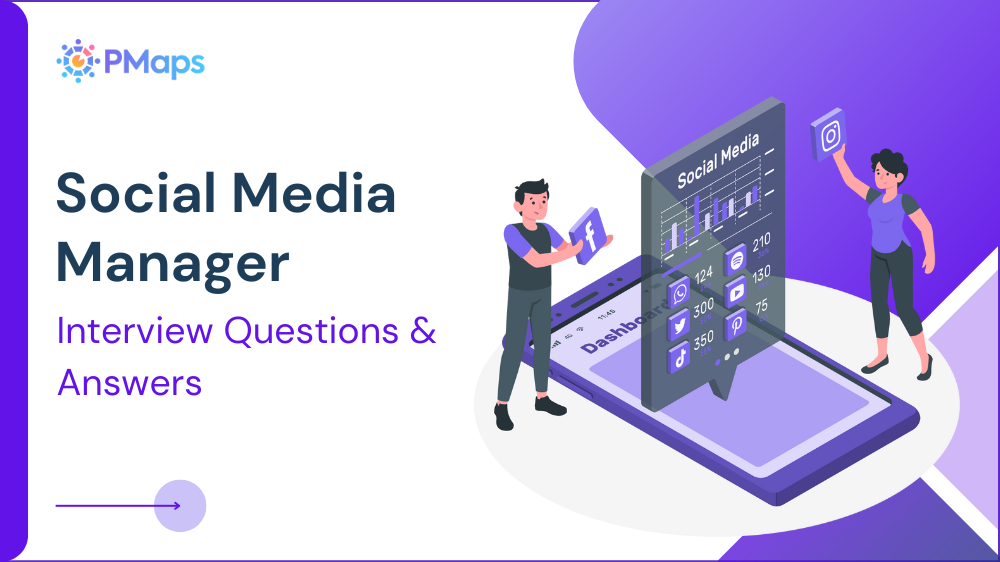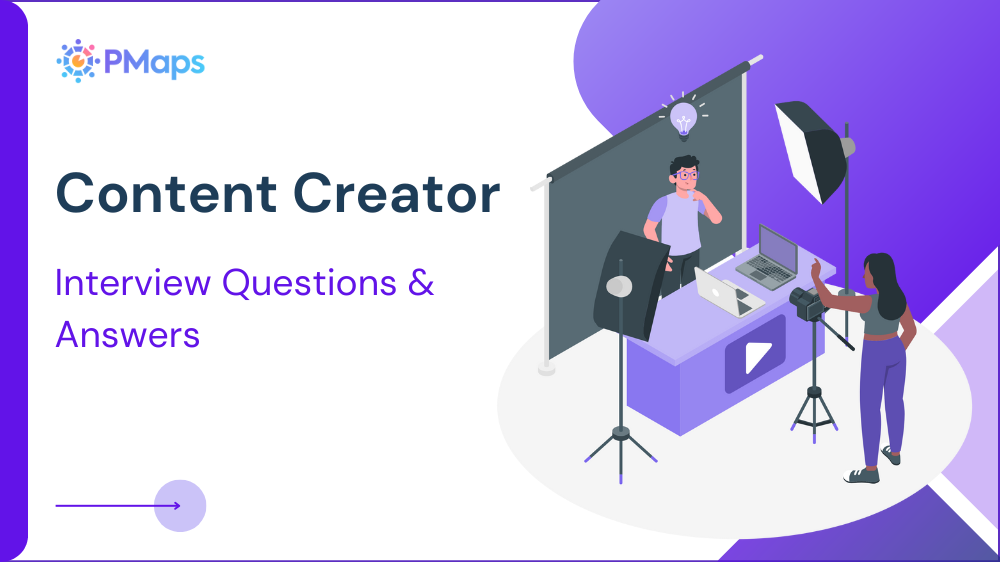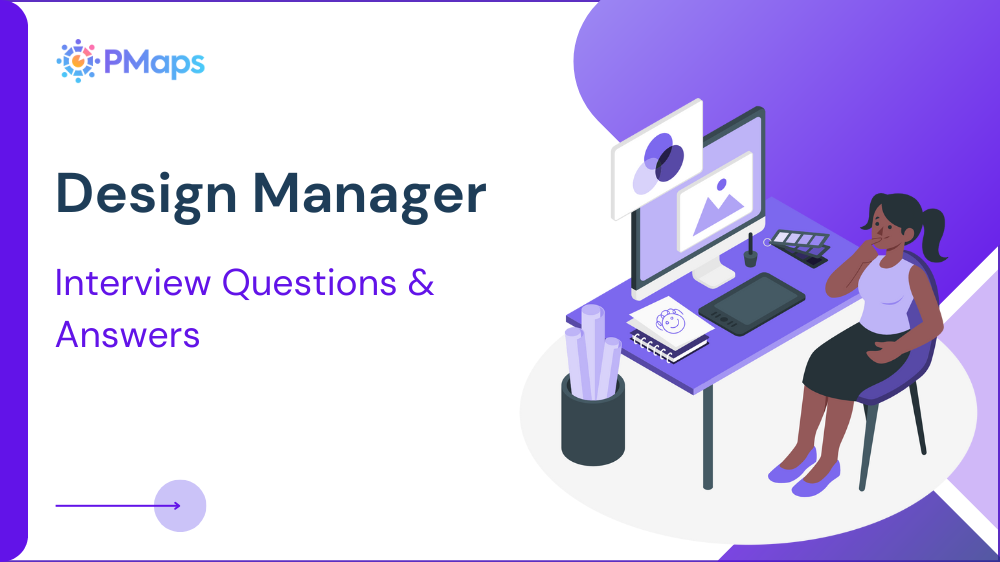
Social media interview questions are central to evaluating how candidates manage brand presence across digital platforms. With businesses relying on engagement, lead generation, and brand awareness through social networks, hiring managers must assess both creativity and strategic expertise. A strong social media manager is not just a content scheduler; they analyze metrics, adapt campaigns, and align content with business goals.
This guide compiles comprehensive social media manager interview questions and answers, covering general, behavioral, situational, and role-specific queries. Each entry highlights what it assesses, what employers should listen for, and a sample ideal answer helping recruiters choose professionals who can thrive in fast-paced, digitally-driven environments.
Likes, shares, or strategy? Run the Social Media Skills Test to assess their real edge.

General Interview Questions for Social Media Managers
General interview questions for a social media manager help evaluate foundational knowledge about platforms, campaign management, and content strategy. These questions for social media manager roles set the tone for deeper assessments later, while straightforward social media manager questions confirm whether a candidate understands the essentials of the job.
1. What platforms do you have the most experience managing?
- What it assesses:
Breadth of platform expertise. - What to listen for:
Familiarity with major channels like Facebook, Instagram, LinkedIn, TikTok, and Twitter (X), along with niche platforms if relevant. - Sample ideal answer:
“I’ve managed Instagram, LinkedIn, and Twitter accounts for B2B brands, and TikTok for B2C campaigns. Each platform required a distinct strategy, which helped me diversify audience engagement.”
2. How do you decide what type of content works best for each platform?
- What it assesses:
Strategic thinking and audience insight. - What to listen for:
References to audience demographics, platform algorithms, and content formats. - Sample ideal answer:
“For LinkedIn, I prioritize long-form professional content; for Instagram, I focus on visuals and reels; while TikTok favors short, relatable videos. I match content to audience behaviors on each platform.”
3. What metrics do you track to measure success on social media?
- What it assesses:
Data-driven mindset and goal alignment. - What to listen for:
Engagement rate, reach, impressions, conversions, and ROI-related metrics. - Sample ideal answer:
“I track engagement rate to gauge relevance, reach to measure visibility, conversions for business outcomes, and audience growth to evaluate brand expansion.”
4. How do you stay updated with changes to social media algorithms?
- What it assesses:
Continuous learning and adaptability. - What to listen for:
Use of newsletters, communities, and platform updates. - Sample ideal answer:
“I subscribe to platform blogs, join social media groups, and test new features. I also track competitor activity to adapt strategies quickly.”
5. Can you describe your experience with paid social media campaigns?
- What it assesses:
Advertising knowledge and ROI orientation. - What to listen for:
Awareness of ad formats, targeting, and budget management. - Sample ideal answer:
“I’ve run Facebook and Instagram ad campaigns with budgets ranging from $500 to $10,000, focusing on lookalike audiences and A/B testing. This consistently improved click-through rates and conversions.”
Behavioral Interview Questions for Social Media Managers
Behavioral interview questions social media manager roles often focus on past experiences to gauge how candidates respond to challenges. These queries are some of the most valuable questions to ask a social media manager, as they reveal adaptability, creativity, and problem-solving under real conditions.
1. Tell me about a time when a campaign exceeded your expectations. What contributed to its success?
- What it assesses:
Analytical reflection and recognition of success factors. - What to listen for:
Concrete metrics and connection between strategy and results. - Sample ideal answer:
“I launched a LinkedIn thought leadership series that doubled engagement in two weeks. Success came from aligning content with trending industry topics and optimizing post timing.”
2. Describe a situation where a campaign underperformed. How did you address it?
- What it assesses:
Accountability, problem-solving, and learning ability. - What to listen for:
Honest acknowledgment of failures and corrective measures. - Sample ideal answer:
“An Instagram campaign underperformed due to weak visuals. I quickly redesigned creatives, tested new captions, and rescheduled posts. Engagement improved by 35% in the next round.”
3. Share an example of collaborating with other departments for a social media campaign.
- What it assesses:
Teamwork and cross-functional alignment. - What to listen for:
Ability to bridge marketing, sales, or product goals. - Sample ideal answer:
“For a product launch, I worked with sales and design to create a multi-channel campaign. The coordination ensured consistency across visuals and messaging, resulting in a 20% sales boost.”
4. Tell me about a time you managed a social media crisis.
- What it assesses:
Crisis management and communication skills. - What to listen for:
Professionalism, timeliness, and balance between transparency and brand protection. - Sample ideal answer:
“When a customer complaint went viral, I drafted a transparent response within an hour, addressed the issue publicly, and offered resolution offline. This minimized reputational damage.”
5. Can you give an example of convincing leadership to adopt a new social media strategy?
- What it assesses:
Persuasion, data-driven argumentation, and leadership buy-in. - What to listen for:
Evidence of stakeholder alignment through metrics and case studies. - Sample ideal answer:
“I proposed shifting the budget to video ads by showing competitor benchmarks and CTR data. Leadership approved, and the campaign yielded 50% more engagement
Need to cross-check expectations? See the Social Media Job Description again.
Situational Interview Questions for Social Media Managers
Situational queries are some of the most effective questions to ask social media manager interview sessions, because they test how candidates think in hypothetical yet realistic scenarios. These are vital in a social media marketing interview, helping assess foresight, adaptability, and judgment. For recruiters, these are also the most practical questions to ask when hiring a social media manager, as they simulate day-to-day decision-making.
1. How would you handle a sudden drop in engagement across all platforms?
- What it assesses:
Analytical thinking and problem-solving. - What to listen for:
References to platform updates, A/B testing, and content adjustments. - Sample ideal answer:
“I’d analyze insights to identify if algorithm changes or content fatigue were factors. I’d test new formats, adjust posting schedules, and re-engage audiences through polls or Q&As.”
2. Imagine a campaign goes live with an error in the caption. What steps would you take?
- What it assesses:
Crisis response and accountability. - What to listen for:
Professionalism in correcting mistakes. - Sample ideal answer:
“I’d quickly edit or delete the post, re-upload the corrected version, and issue a clarification if needed. Transparency and speed are key to minimizing negative reactions.”
3. Suppose leadership asks for an unrealistic campaign deadline. How would you respond?
- What it assesses:
Stakeholder management and prioritization. - What to listen for:
Balance of diplomacy and practicality. - Sample ideal answer:
“I’d communicate the risks of rushed content and propose a phased rollout. If timelines couldn’t shift, I’d prioritize core deliverables and set clear expectations on output quality.”
4. How would you manage conflicting requests from marketing and sales teams?
- What it assesses:
Conflict resolution and prioritization. - What to listen for:
Evidence of structured compromise and escalation if necessary. - Sample ideal answer:
“I’d align both teams by focusing on shared business goals. If conflicts persisted, I’d propose a joint content calendar and escalate unresolved issues to leadership for direction
Technical and Role-Specific Interview Questions for Social Media Managers
Technical queries often simulate practical challenges, making them similar to a social media test for an interview. These questions reveal not only platform skills but also the ability to train and guide junior staff. For instance, pairing interview questions for social media intern with managerial expectations can help recruiters assess mentorship ability. Similarly, social media onboarding questions highlight how candidates introduce new hires or freelancers to brand standards.
1. Which social media management tools do you prefer, and why?
- What it assesses:
Technical familiarity and workflow efficiency. - What to listen for:
Mention of tools like Hootsuite, Buffer, Sprout Social, or native analytics dashboards. - Sample ideal answer:
“I use Hootsuite for scheduling, Buffer for campaign planning, and native analytics tools to track real-time engagement. These provide both control and insights for optimization.”
2. How do you ensure brand consistency across multiple platforms?
- What it assesses:
Process discipline and branding knowledge. - What to listen for:
References to style guides, templates, and content calendars. - Sample ideal answer:
“I maintain a brand playbook covering voice, tone, and visuals. I also use shared calendars and templates to keep all team members aligned.”
3. How would you guide a social media intern in their first project?
- What it assesses:
Mentorship and training ability. - What to listen for:
Structured onboarding steps and feedback mechanisms. - Sample ideal answer:
“I’d assign a manageable task like drafting captions, review it together, and provide constructive feedback. This helps interns learn brand guidelines while gaining confidence.”
4. How do you approach onboarding new freelancers or team members?
- What it assesses:
Team leadership and process orientation. - What to listen for:
Mention of training sessions, style guides, and collaborative tools. - Sample ideal answer:
“I start with a brand induction session, provide access to our playbook, and set clear content approval workflows. This ensures consistency and smooth onboarding.”
5. What’s your approach to integrating paid ads with organic social media strategy?
- What it assesses:
Strategic balance and campaign integration. - What to listen for:
Practical examples of cross-channel synergy. - Sample ideal answer:
“I use paid ads to amplify top-performing organic content. For example, I boost posts with high engagement to reach larger audiences while keeping campaigns cost-efficient.”
Pro Tips for Interviewing Social Media Managers
Evaluating candidates goes beyond standard social media marketing questions and answers. A skilled social media manager must show both creative instincts and data-driven decision-making. Here are some proven strategies to refine your hiring process:
Test content judgment with real examples.
Share a past campaign or piece of content and ask candidates how they’d improve it. This reveals their critical eye and creativity.
Evaluate analytics literacy.
A strong manager doesn’t just post content—they analyze metrics. Look for candidates who interpret KPIs like CTR, engagement rate, and conversions, and connect them to business objectives.
Simulate a real campaign challenge.
Instead of relying solely on theory, use mini case studies—such as managing a sudden drop in engagement—to test adaptability.
Check trend awareness.
Social media evolves rapidly. Candidates should demonstrate how they stay updated and apply trends without compromising brand voice.
Look for leadership and mentoring ability.
Great managers can guide interns, freelancers, or cross-functional partners. Strong responses highlight structured onboarding and feedback processes
Conclusion
Well-crafted social media manager interview questions allow recruiters to assess not just content scheduling skills but also strategy, analytics, and leadership. By combining general, behavioral, situational, and technical scenarios, hiring teams can identify candidates who balance creativity with measurable business impact.
For a detailed overview of the role, responsibilities, and required competencies, review our Social media job description. To validate technical and strategic ability before interviews, connect with PMaps at 8591320212 or assessment@pmaps.in.









